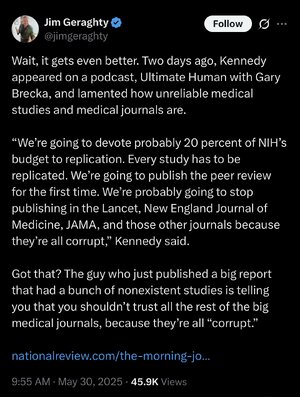- Messages
- 22,358
“Health Secretary Robert F. Kennedy Jr. says his “Make America Healthy Again” Commission report harnesses “gold-standard” science, citing more than 500 studies and other sources to back up its claims. Those citations, though, are rife with errors, from broken links to misstated conclusions.
Seven of the cited sources don’t appear to exist at all.
Epidemiologist Katherine Keyes is listed in the MAHA report as the first author of a study on anxiety in adolescents. When NOTUS reached out to her this week, she was surprised to hear of the citation. She does study mental health and substance use, she said. But she didn’t write the paper listed.
“The paper cited is not a real paper that I or my colleagues were involved with,” Keyes told NOTUS via email. “We’ve certainly done research on this topic, but did not publish a paper in JAMA Pediatrics on this topic with that co-author group, or with that title.”
It’s not clear that anyone wrote the study cited in the MAHA report. …”
——
Did they have AI draft their report and it imagined up studies to support their pre-ordained conclusions that no one bothered to check? Or is this just sloppy human work either by the RFK team or, as MAHA and MAGA frequently argue, remaining deep state HHS employees intentionally sabotaging the report with fake references?
White House blames 'formatting' for errors in RFK Jr.'s MAHA report. Authors push back.

White House blames 'formatting' for errors in RFK Jr.'s MAHA report. Authors push back.
Researchers listed in the MAHA report have come forward since its publication saying the articles cited don't exist or were used inaccurately.
“… “I understand there were some formatting issues with the MAHA report that are being addressed and the report will be updated,” Leavitt told reporters May 29. “But it does not negate the substance of the report.”
She also didn't say whether the report was generated by artificial intelligence, or AI, as some have questioned.
Although it’s difficult to determine whether scientific articles are generated or “touched up” by AI, there are telling signs, said Yuan Luo, professor and chief AI officer at Northwestern University’s clinical and translational sciences institute.
Some of those signs may include citation gaps, factual inconsistencies and irrelevant conclusions derived from random research.
…The MAHA report erroneously said an article on the impact of light from computer monitors was published in the journal Pediatrics when it wasn’t, according to the study’s author Mariana Figueiro, a professor at Icahn School of Medicine at Mount Sinai….”





